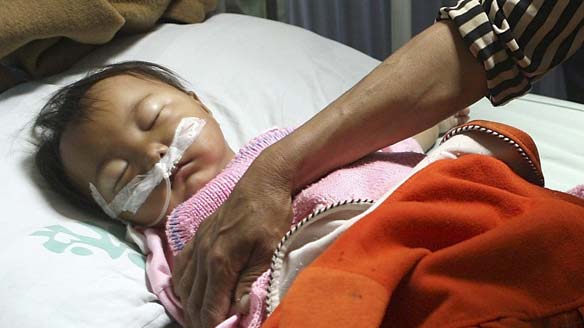Despite efforts to create a modern food-safety regimen in China, oversight remains utterly haphazard, in the hands of ill-trained, ill-equipped and outnumbered enforcers whose quick fixes are even more quickly undone.
So says the New York Times in Sunday’s edition.
Dr. Peter Ben Embarek, a food safety expert with the World Health Organization’s Beijing office, who’s usually blunt, said, “Most of them are working like headless chickens, having no clue what are the major  food-borne diseases that need to be addressed or what are the major contaminants in the food process.”
food-borne diseases that need to be addressed or what are the major contaminants in the food process.”
In recent weeks, China’s news media have reported sales of pork adulterated with the drug clenbuterol, which can cause heart palpitations; pork sold as beef after it was soaked in borax, a detergent additive; rice contaminated with cadmium, a heavy metal discharged by smelters; arsenic-laced soy sauce; popcorn and mushrooms treated with fluorescent bleach; bean sprouts tainted with an animal antibiotic; and wine diluted with sugared water and chemicals.
Even eggs, seemingly sacrosanct in their shells, have turned out not to be eggs at all but man-made concoctions of chemicals, gelatin and paraffin. Instructions can be purchased online, the Chinese media reported.
Scandals are proliferating, in part, because producers operate in a cutthroat environment in which illegal additives are everywhere and cost-effective.
Manufacturers calculate correctly that the odds of profiting from unsafe practices far exceed the odds of getting caught, experts say. China’s explosive growth has spawned nearly half a million food producers, the authorities say, and four-fifths of them employ 10 or fewer workers, making oversight difficult.

 said.
said..jpg) health care would be 1 in 300," Liam Donaldson, the WHO’s newly appointed envoy for patient safety, told a news briefing.
health care would be 1 in 300," Liam Donaldson, the WHO’s newly appointed envoy for patient safety, told a news briefing. food-borne diseases that need to be addressed or what are the major contaminants in the food process.”
food-borne diseases that need to be addressed or what are the major contaminants in the food process.”